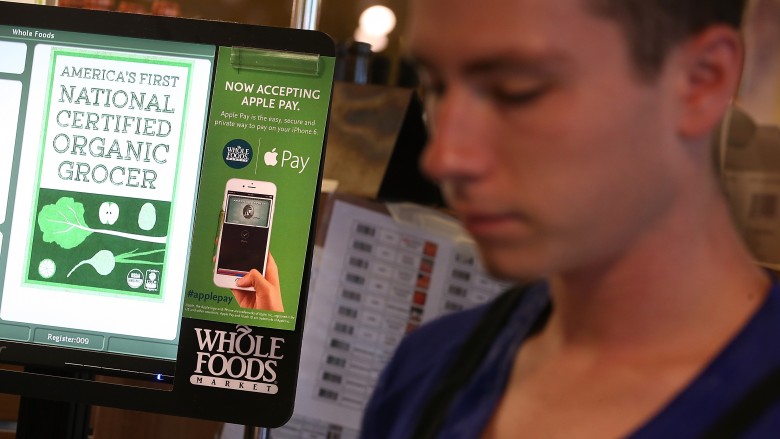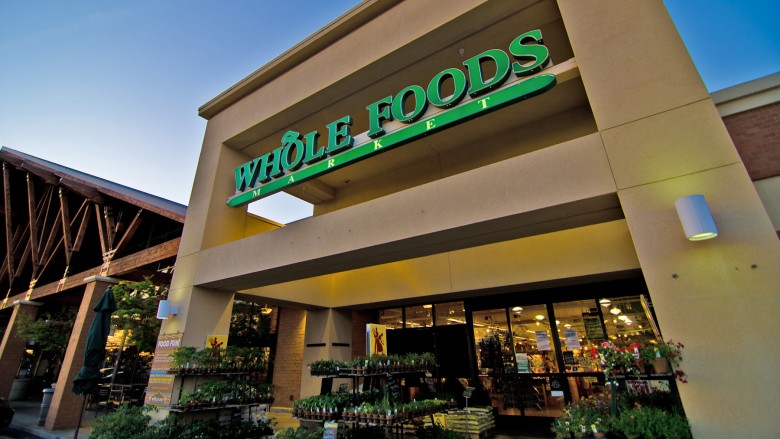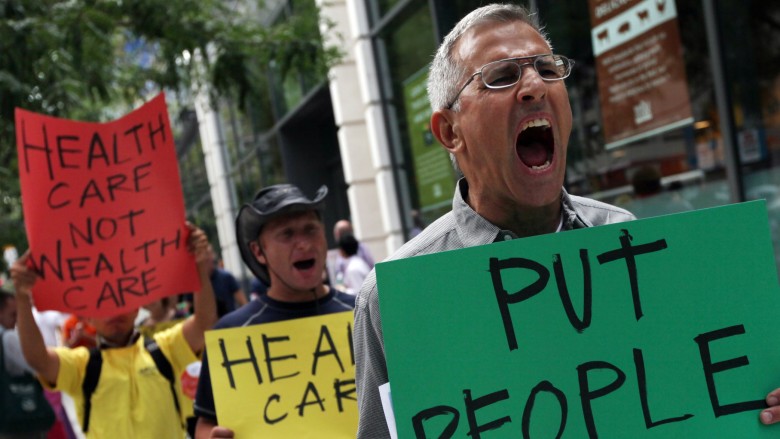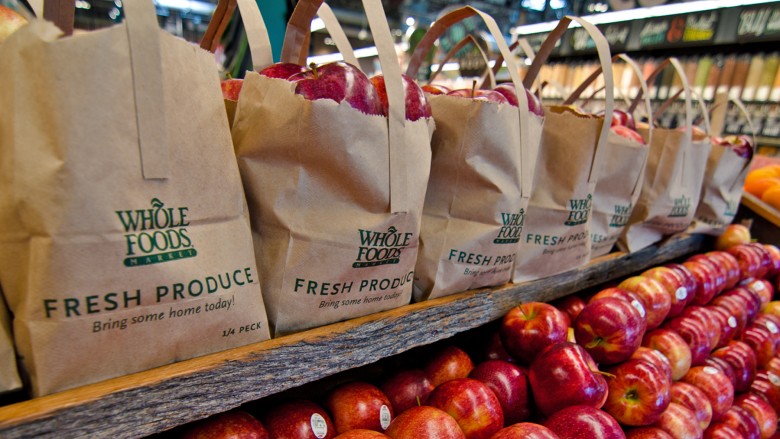Things Whole Foods Doesn't Want You To Know
Whole Foods Market is the quintessential organic grocery store chain — a place where you expect everything to be healthy and fresh and clean and open. And expensive, too. But this organic behemoth had much humbler beginnings. Whole Foods started out with just 19 employees as a typical hippy-dippy health food store in 1980 in the college town of Austin, TX. Now, it is the biggest natural food market chain in the U.S. As of early 2017, Whole Foods had over 460 stores in North America and the United Kingdom. Yet for all their openness, there are still some secrets they don't want you to know.
Whole Foods is facing slumping sales
In February 2016, the chain reported their worst sales performance in a decade and revealed that they had their sixth consecutive quarter of slumping same-store sales. Whole Foods also announced that they are closing nine stores, the most ever at one time, and lowered their sales outlook for the rest of the year. While they still generated $4.92 billion in revenue in the last quarter, they were projected to make $4.98 billion.
In some ways, Whole Foods Market is a victim of its own success. Organic food is rapidly rising in popularity, increasing over 200 percent in sales over the past decade, according to the Organic Trade Association (via The Washington Post). And 53.3 percent of such food sales are made through traditional supermarkets and big-box retailers, who charge less for organic food. So now that even Walmart is in the organics game, what once made WFM special is no longer unique.
Their CEO John Mackey was an internet troll
The cliche about anonymous internet commenters is that they're losers living in their mother's basement. Not that they run billion-dollar corporations. But it turns out that from 1999 to 2006 , John Mackey, Whole Foods' co-founder and CEO, wrote negative things on the Yahoo! Finance message boards about then-rival natural foods chain Wild Oats. He used the pseudonym Rahodeb, an anagram of his wife's Deborah's name, to make over 1,100 comments. Mackey wrote, among other things, that Wild Oats "has no value and no future."
The news of his shenanigans came out when the Federal Trade Commission tried to stop Whole Foods in 2007 from swallowing up Wild Oats. Whole Foods ultimately prevailed in purchasing the rival, but Mackey's reputation took a hit.
The chain's overcharging scandal was much more extensive than previously reported
One of the other reasons Whole Foods' sales have been slumping is the chain getting into hot water with an overcharging scandal. Government agencies in both California in 2014 and New York in 2015 cited the chain for doing things such as "adding the weight of containers when charging for food at the salad bar and hot bar, or including less than the weight advertised for items sold by the pound."
Although the stores' brass tried to downplay the issues as innocent mistakes, New York City's Department of Consumer Affairs head Julie Menin claims that her inspectors said: "this is the worst case of mislabeling they have seen in their careers."
NYC Consumer Affairs found that 89 percent of the packages "did not meet the federal standard for the maximum amount that an individual package can deviate from the actual weight." They found that Whole Foods overcharged between 80 cents for pecan panko to an incredible $14.80 extra on coconut shrimp. And in multiple cases, the stores also charged for the weight of the box or packing materials — a big no-no.
Whole Foods used prison labor to make some of their products
The company contracted with Colorado Correctional Industries for prisoners to farm tilapia and make high-end cheeses. The prisoners got paid between 74 cents and $4 dollars per day for the work, while the stores sold the items for much more money. Whole Foods stopped the practice in 2015 after word got out about the prison labor.
But there is a conundrum here. As unseemly as it may seem, the prisoners were learning valuable skills that could help them earn a living when they got out of jail. And as causes like Puppies Behind Bars have shown, inmates can help society with such labor behind bars. As Vice explains, "The inmates are desperate for the work and the minuscule payment they get." Plus some of the money earned by CCI ultimately went back to the taxpayers. Justifying this wasn't a fight Whole Foods wanted to make, though.
One of their NYC locations has allegedly become "a social club for junkies"
The New York Post wrote in January 2016 about how the chain's Bowery location had reportedly turned into a haven for homeless people and addicts, who take advantage of the free wifi, seating, and restroom facilities to hang out there all day. According to the paper, "During five visits to the store in recent weeks, a reporter saw a modern-day Bowery bum sleeping in the fetal position, another nodding out in an obvious drug-induced haze, a few who appeared to be drunk, and one smearing toothpaste on his face and mumbling to himself." Not very appetizing.
Dzhokhar Tsarnaev went to Whole Foods to buy milk right after bombing the Boston Marathon
Talk about cold-blooded. Less than 30 minutes after setting off bombs at the Boston Marathon in April 2013 with his brother, Dzhokhar Tsarnaev was spotted on surveillance camera in the Cambridge Whole Foods pondering what kind of milk to buy. And after buying the milk, he changed his mind and exchanged it for another kind. Not exactly the kind of customer Whole Foods wants to brag about. According to the Boston Globe, a store manager told the paper, "We are not allowed to comment on it.”
They have some really insufferable customers
From the wag who thinks he is the first to say "Whole Paycheck", to uber-vegans, to the guy who's just there to pick up hot women in Lululemon, Whole Foods has some super-annoying customers. Thrillist spoke to former store employees who mocked people like the "the supplement-trend zealot" who buys whatever Dr. Oz recommends, "the bulk-bin number ignorer... who thinks that cashiers can't tell the difference between peanuts and cashews," and "the armchair environmentalist" with inconsistent standards about local vs. organic. And anybody who has ever been in line behind the "cell phone diva" knows how irritating that can be.
Whole Foods reportedly has a hardcore anti-shoplifting policy
According to several news stories on the issue, Whole Foods has a "one-strike" policy against shoplifting. They allegedly ban people for life after one accusation, even if the person offers to pay for an item that they inadvertently didn't ring up. One Chicago woman who was struggling to deal with her kids while shopping told Chicago magazine that she accidentally forgot to pay for a bottle of vitamins. When she was caught, she claimed security took a photo of her, made her sign a document about the incident, and banned her forever, until she protested up the chain of command. There are several other reports of the store banning people who claim (and appear to be) innocent.
Then again, there are also thieves who are addicted to stealing from them. High-end shopkeepers told Grub Street that "many owners say they've seen a rise in the realm of gourmet-food theft." And even Chicago Magazine, which wrote about the woman banned from Whole Foods, acknowledged that shoplifting is a big problem at the stores.
Mackey's politics are not the same as his target audience
You would expect the people behind Whole Foods to be as liberal as their customers. But the reality is that Whole Foods co-founder and CEO Mackey is more libertarian than liberal, and has even called Obamacare "fascist," saying in 2013: "In fascism, the government doesn't own the means of production but they do control it and that's what's happening with the health care program with these reforms and so I'd say the system is becoming more fascist." In that same year, Mackey told Mother Jones that climate change was "perfectly natural and not necessarily bad." And in a 2009 Wall Street Journal op-ed piece, he used a quote by Margaret Thatcher about how "The problem with socialism is that eventually you run out of other people's money."
Mackey is also against unions
Whole Foods mostly offers very good pay and benefits compared to other grocery stores, although they did have layoffs of 1,500 staffers last year — about 1.6 percent of their workforce — with some accusing them of targeting those employees who were making more money. But WFM doesn't want unions, as Mackey has made clear. He once said: "The union is like having herpes. It doesn't kill you, but it's unpleasant and inconvenient, and it stops a lot of people from becoming your lover." Mackey claimed, though, that the stores are not "anti-union" as much as "beyond unions."
Ironically, the chain popularized the term "artisanal" to describe its goods. Liberal publication In These Times notes that doing so "unwittingly aligns the store's stock displays with the skilled workers who founded the first medieval guilds that would later serve as models for mass unionism." The magazine suggests that Whole Foods customers ought to "let the store's management know that a real artisanal store experience would include collective bargaining rights for the company's workforce."
The Patent Office rejected their slogan change
It wasn't enough for Whole Foods Market to call themselves "America's healthiest grocery store." They wanted to be called the "world's healthiest grocery store," a claim the U.S. Patent Office rejected in 2016 for being too "laudatory," a term The Washington Post says means "exaggerated praise that can't be proven or has not been proved true." The company had six months to refile or appeal the case and they decided not to; maybe even they realized the hubris involved with that slogan.
Whole Foods allegedly fired employees so they didn't have to pay them bonuses
In 2016, Whole Foods accused several staffers of manipulating the chain's "gainsharing" bonus program, but now the staffers are suing the chain for defamation. The lawsuit, filed in federal court, says (via The Washington Post): "Whole Foods, which touts itself as an employee friendly corporation, engaged in a nationwide practice to subvert earned employee bonuses," and that 'When confronted with the systemic wage theft, Whole Foods attempted to cover up the corporate fraud and wage theft by terminating the nine whistleblower Plaintiffs." Whole Foods is fighting the lawsuit.
Fitter, thinner employees get a better employee discount
The standard Whole Foods employee discount is 20%, but it gets bumped up to 30% if you meet certain health standards, including blood pressure, cholesterol level, and body mass index (BMI) in a yearly physical. Jezebel criticized the plan for using BMI, noting that even Mackey acknowledged it wasn't a perfect measure of health. The website snarked: "Because if public health research has taught us anything, it's that reducing people's buying power totally makes them healthier. Stay classy, Whole Foods."
They make a lot of money on non-healthy foods and booze
Even though Whole Foods outlets are supposed to be healthy grocery stores, they sell a lot of junk food, including potato chips (albeit organic ones) and beer, as well as plenty of fried food items. Then-co-CEO Walter Robb even told NPR in 2005 about the chocolate fountain in one of their Austin, Tx stores: "You can take essentially anything you want in the store, a piece of fruit, whatever, and dip it in chocolate. The height of decadence." Not exactly healthy living.
The chain had ties to a wacky guru accused of sexual abuse
Mackey was once on the board of New Age guru and former Rabbi Marc Gafni's Center for Integral Wisdom, before the New York Times wrote in 2015 about allegations of sexual misconduct against Gafni. And at one point, Whole Foods had a seven-part interview on its website between Mackey and Gafni. The spiritual leader had said the following about one of the accusers: "She was 14 going on 35, and I never forced her." Protesters announced plans to protest a February 2017 speech by Mackey, saying they needed "sexual violence accountability."
Whole Foods reportedly fired an employee who stayed home on a snow day to take care of her special needs son
Chicago Whole Foods employee Rhiannon Broschat claimed she couldn't find child care on a snow day, and she ended up losing her job over it, even though she said her team leader said she could stay home. Fellow employees in Chicago and Austin protested the decision. But the corporate office said it was not just that one day that cost her the job, saying that "No team member is ever dismissed for a single unexcused absence" and that "no one in a leadership position" told employees to stay home that day "as all stores were open, roads were clear, public transportation was running and many public services were operational."
Their stores and facilities are not always pristine
You would think Whole Foods stores would be squeaky clean. That isn't always the case. In 2016, the FDA warned Whole Foods in a letter about "serious violations" at a food preparation facility in Everett, Washington, saying that the company "failed to manufacture, package and store foods under conditions and controls necessary to minimize the potential for growth of microorganisms and contamination."
And one of their DC stores was closed twice by the Board of Health; once in 2016 for "failing to minimize the presence of insects, rodents and other pests" and another time in 2013, also due to health-related violations. Not very appetizing.
What's next for Whole Foods?
Whole Foods Market certainly isn't perfect, that's for sure. Nor is John Mackey, their CEO. Despite all of this, Whole Foods Market stores still has many loyal customers. Because if you're looking for high-quality meats and organic produce, or tasty prepared foods, WFM offers delicious, albeit often expensive, options. Simply shopping in the store can make you feel virtuous, and maybe even a little smug.
We have to hand it to WFM, at least the company's leadership is acknowledging that there is an issue with sales. In recent years, Whole Foods has discounted multiple items, including a prepared Thanksgiving dinner, to try to shed its "Whole Paycheck" reputation for high prices. Only time will tell if the chain's plans at reinventing themselves, including opening the smaller, more affordable 365 by Whole Foods Market stores, will be successful.


















